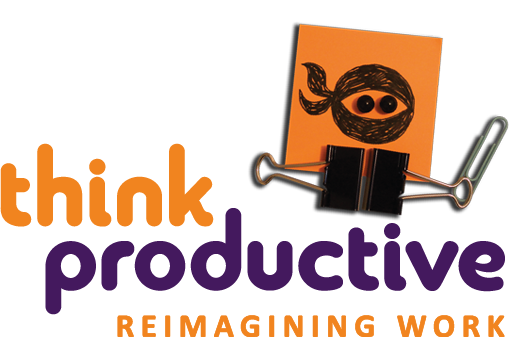I was running a Stress Less, Achieve More workshop recently in an organisation with a very collaborative and compassionate team-working culture. People genuinely cared about each other, relied on each other to do their work well, and hated saying no or letting others down.
It was clearly a great place to work. But it was also highly distracting. So after working on personal ways of managing distractions, reducing stress and boosting productivity, the inevitable question came: “What about everyone else? How do we make it work within this culture that is so reactive and interdependent?”
It’s one thing putting personal productivity habits into action, but what about the people you work with?
Aside from encouraging them to do the same workshop 😉 here are six ways to encourage productivity and reduce distractions in your working relationships:
1. Be proactive about giving your help
Instead of “Come and find me if you have questions” try “Let’s catch up next week when you’ve had a chance to digest and go over any questions. Is Monday good for you?”
Or ask: “What do you think you’ll need from me?”
2. Think ahead and set expectations
Chief Ninja Graham sent an email round last week to say “next week I’m off the grid”. In Ninja terms, he was ‘going dark’ and would be unavailable on social media, email or phone for the whole week to get a big chunk of writing done.
“I’m around all of this week if you need stuff though. And then back on Monday 3rd March.”
Instead of just doing a disappearing act, he gave us notice. As it happened there was something I wanted to talk to him about. In my own timing, I would have gotten in touch this week, but because of this note we arranged to speak last Friday instead. And that worked out well.
3. Use Agendas
When there’s someone you work closely with, it’s easy to get into the habit of firing off questions when they come to mind and end up constantly interrupting each other.
Instead, keep a running agenda of all the things you want to discuss with them, and ask them to do the same. That way, when you speak, you have a list of everything you want to ask or discuss, rather than interrupting each other throughout the day.
4. Ask
“When do you need that for?”
“Is it ok if I get back to you at 4pm on that?”
“I’ll have a better idea of that on Tuesday, can we speak then?”
Sometimes we assume that other people need things urgently from us. Maybe they do, maybe it’s just when it happens to come up on their radar. Either way, you won’t know until you ask. Avoid mind reading. Just ask.
Ask yourself too: What’s the most helpful way of doing this? How can I best help? Being responsive depends on your ability to respond. You’re probably not giving them your best attention if you’re always working under last minute reactiveness.
5. Use signals
At Think Productive UK, our Chief Operating Officer Elena, puts a china cat on her desk when she needs to focus on a piece of work without interruption. It’s her way of saying to the rest of the office that she’s not available right now. Other people use headphones, signs or other signals.
Make sure you communicate this one beforehand, and use it sparingly, so everyone knows and respects that you won’t be unavailable forever.
6. Set the example
Culture forms from habit, and is perpetuated by unwritten rules. When you form new habits, communicate them well, explain your reasons and most of all show the benefits.
Be the change you want to see. Be the one who gets to the point in meetings. Be the one to use CC clearly and considerately. Be the one to think ahead and give advanced notice instead of asking for things last minute. Be the one to say no nicely.
Because when you do, you give others permission to do the same.
Ultimately it’s not just about you. You can be sure that if distractions are rife and costing you time, attention and peace of mind, it’s costing your colleagues too.
If your organisation has developed a culture of being too helpful, too reactive and mutually disruptive, perhaps it’s time to ask what productivity practices are most helpful to the whole team.
Who distracts you the most at work? Who do you distract the most? What productive co-working practices work well for you?
Share your comments and thoughts below.
